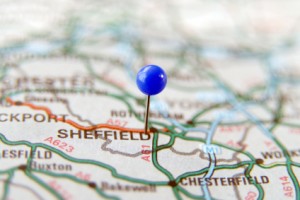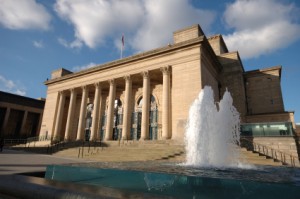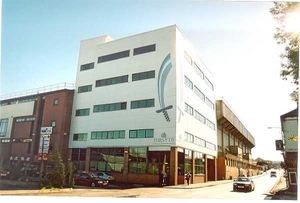
Last updated March 2023 A guide to serviced offices and office space for rent in Sheffield as well as general information that may be useful if you are considering renting office space in the city.
For further offices information or to search office space for rent in Sheffield just click. Or contact us for any other office space query.
History & Geography
Sheffield is nestled in the rolling hills of South Yorkshire at the confluence of the rivers Don, Rivelin, Loxley, Porter and Sheaf, from where the city derives its name. Sheffield is built in a natural amphitheatre made up of the surrounding hills and most of its buildings have been constructed on hillsides looking into the centre of town or the surrounding countryside. During the Iron Age the area around Sheffield was occupied by the Brigante tribe, and after the Roman occupation was part of the kingdom of Elmet. However, it was in Anglo-Saxon times that permanent settlements were built on what is now Sheffield. It was after the Norman conquest that Sheffield castle was built to protect the area, and a town developed. By the 13th century, Sheffield had grown into a thriving market town, and by the 14th century, it was already famous for its production of knives. So began the city’s lasting association with cutlery and later steel. By the 1600s Sheffield was the largest cutlery centre in England. In the 1740s production techniques for forming steel were developed further along with the technique of silver plating using a copper ingot, which became known as Sheffield plate. The city continued to grow, despite a Cholera epidemic in the 1840s, its population more than quadrupling by the early 10th century. During WWII Sheffield’s steel industry was directed towards making weapons and munitions, which made it a major bombing target for the Luftwaffe. In what became known as the Sheffield Blitz many lives were lost and property destroyed. In the latter half of the century, Sheffield’s steel industry declined sharply, resulting in massive unemployment and poverty. The city centre fell into decline and the city’s economy suffered. However, in the 1990s and later major regeneration projects invigorated the city and the railway station and city centre were completely refurbished. Today Sheffield is one of the most aesthetically beautiful and economically dynamic cities in the UK.
Economy
For many years, the economy of Sheffield suffered from the decline of its steel industry, however, it experienced a dramatic revival in the 2000s. There was a wave of redevelopments including the Winter Gardens, Peace Gardens and Millennium Galleries. Many of the projects took place under the Sheffield One development agency. Between 1997 and 2007, the economy of the city grew by almost four billion pounds. Sheffield has also built a reputation as the greenest city in the UK, featuring 2.5 million trees and the highest tree-to-person ratio of any city in Europe. Among the companies which have a major presence in Sheffield are Cap Gemini, Capita, Dixons, IBM, Yorkshire Building Society, Siemens, EDS and the steelmaker Corus Group. Sheffield’s steel and cutlery industries are certainly not what they once were, the city still has a reputation for expertise in the industries. The city is home to Forgemasters, the last remaining independent steelworks in the world. The company produces the largest and most advanced steel forgings and castings and produces the largest ingots in Europe. The city also has a thriving retail industry, mostly centred around the High Street, Fargate Orchard Square and the Devonshire Quarter.
 Tourism & Culture
Tourism & Culture
While Sheffield is not known for its tourism industry, the city has a culture all its own and visitors to this thriving city will not lack for things to do. The city hosts a range of festivals, including the Sensoria Music and Film Festival, the Tramlines Festival and the Grin Up North Comedy Festival. Sheffield also has a variety of excellent music venues such as Harley Hotel, Leadmill, West Street Live, Dove & Rainbow, The Casbah and New Barrack Tavern. Additionally, Sheffield also has the largest theatre complex in the UK outside London, consisting of the Lyceum Theatre, Crucible Theatre and Studio Theatre. Sheffield is renowned for its green spaces and is considered the greenest city in Europe. The most famous of the city’s gardens are the Sheffield Botanical Gardens, The Peace Gardens and The Sheffield Winter Gardens. However, for visitors in search of more exciting diversions, the city is also renowned for its thriving nightlife and pub culture. The Old Queen’s Head, located next to Sheffield Interchange is said to date from 1475. West Street is the centre of the city’s nightlife and is lined with pubs and clubs popular with students. Leopold Square, a new development on the northern end of West Street is the latest addition to the city’s nightlife.
Transportation
Sheffield train station serves the Midland Main Line, one of the major train routes through northern England. Through London St Pancras station Sheffield now also has a direct route to mainland Europe. Doncaster Sheffield Airport is the nearest airport to Sheffield, located 18 miles from the city centre. In Sheffield itself, the Sheffield Supertram is a popular means of transport, as is the local bus network, which has its main hub at Sheffield Interchange.
 Office space to rent in Sheffield
Office space to rent in Sheffield
2012 saw the office market in Sheffield rebound significantly from the Great Recession with a large amount of small to medium-sized deals taking place in the city centre. In 2013, Sheffield had just under ten million square feet of office stock and as such, remained the major office market in South Yorkshire. The previous decade’s regeneration efforts saw the quality of offices in and around the city centre dramatically improve for the better.
There was also a large amount of office space outside Sheffield’s inner ring road, primarily in the southwest and the other around the M1 corridor. in 2013, out-of-town offices rented for an average of £12 per square foot per annum, whereas the city centre had a headline rent of £20 per square foot per year.
2018 saw a 40-year high for the Sheffield office market with headline rents quoted at £25 per square foot in the city centre.
In 2022, Sheffield was one of the best-performing regional markets with total take-up at circa 400,000 square feet. This number was boosted considerably by BT’s acquisition of 62,862 square feet of BREEAM Excellent office space at Digital Campus in Q3 of the year.
In 2023, it is expected that headline rents for leased office space will reach £27 per square foot.
There are 8 flex space providers in Sheffield that offer alternative flexible office space and workspace solutions on short-term flexible contracts with all-inclusive pricing.
The flexible solutions include private serviced offices, managed office suites and corporate coworking membership plans.
The profiles of all of these operators can be seen in the following directory.
Our office space search, advisory and acquisition services are FREE, always. Our Sheffield office space brokers and agents are globally regulated by the Royal Institution of Chartered Surveyors (RICS) ensuring the highest standards of commercial property advice and service at all times.

The Office Providers are Regulated by the RICS